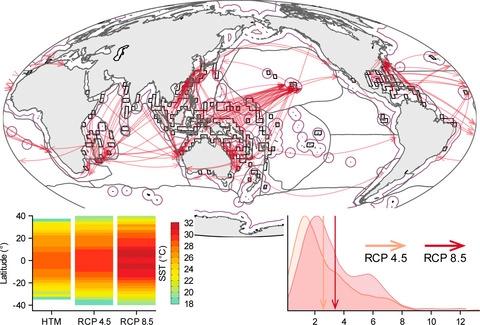当前位置:
X-MOL 学术
›
Glob. Change Biol.
›
论文详情
Our official English website, www.x-mol.net, welcomes your
feedback! (Note: you will need to create a separate account there.)
Faster ocean warming threatens richest areas of marine biodiversity
Global Change Biology ( IF 10.8 ) Pub Date : 2022-07-07 , DOI: 10.1111/gcb.16328 Stuart C Brown 1, 2 , Camille Mellin 1 , Jorge García Molinos 3, 4 , Eline D Lorenzen 2 , Damien A Fordham 1, 2
Global Change Biology ( IF 10.8 ) Pub Date : 2022-07-07 , DOI: 10.1111/gcb.16328 Stuart C Brown 1, 2 , Camille Mellin 1 , Jorge García Molinos 3, 4 , Eline D Lorenzen 2 , Damien A Fordham 1, 2
Affiliation

|
The vulnerability of marine biodiversity to accelerated rates of climatic change is poorly understood. By developing a new method for identifying extreme oceanic warming events during Earth's most recent deglaciation, and comparing these to 21st century projections, we show that future rates of ocean warming will disproportionately affect the most speciose marine communities, potentially threatening biodiversity in more than 70% of current-day global hotspots of marine species richness. The persistence of these richest areas of marine biodiversity will require many species to move well beyond the biogeographic realm where they are endemic, at rates of redistribution not previously seen. Our approach for quantifying exposure of biodiversity to past and future rates of oceanic warming provides new context and scalable information for deriving and strengthening conservation actions to safeguard marine biodiversity under climate change.
中文翻译:

更快的海洋变暖威胁着海洋生物多样性最丰富的地区
海洋生物多样性对加速气候变化的脆弱性知之甚少。通过开发一种新方法来识别地球最近一次冰川消融期间的极端海洋变暖事件,并将这些与 21 世纪的预测进行比较,我们表明未来的海洋变暖速度将不成比例地影响最特殊的海洋群落,可能威胁到超过 70% 的生物多样性当今全球海洋物种丰富度的热点。这些最丰富的海洋生物多样性区域的持续存在将需要许多物种以前所未有的重新分布速度远远超出它们特有的生物地理领域。
更新日期:2022-07-07
中文翻译:

更快的海洋变暖威胁着海洋生物多样性最丰富的地区
海洋生物多样性对加速气候变化的脆弱性知之甚少。通过开发一种新方法来识别地球最近一次冰川消融期间的极端海洋变暖事件,并将这些与 21 世纪的预测进行比较,我们表明未来的海洋变暖速度将不成比例地影响最特殊的海洋群落,可能威胁到超过 70% 的生物多样性当今全球海洋物种丰富度的热点。这些最丰富的海洋生物多样性区域的持续存在将需要许多物种以前所未有的重新分布速度远远超出它们特有的生物地理领域。











































 京公网安备 11010802027423号
京公网安备 11010802027423号